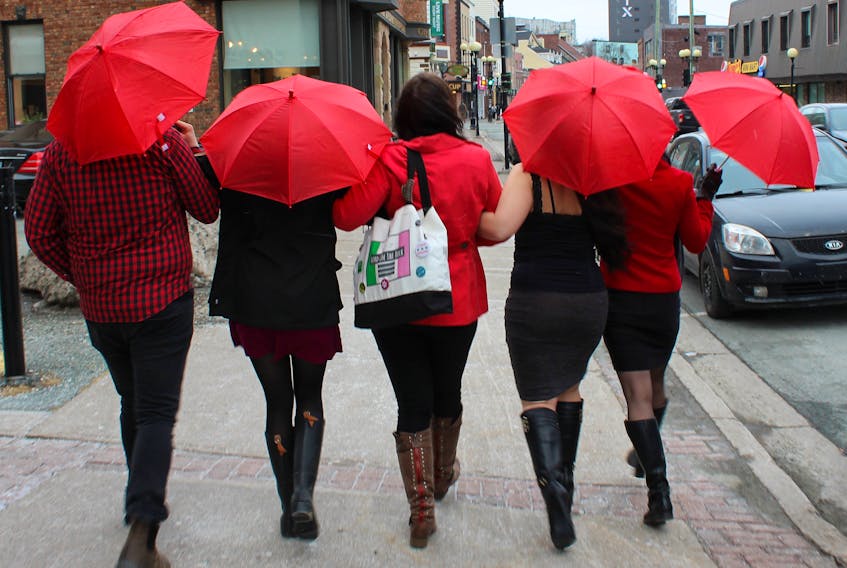On Nov. 11, 2017, a 36-year-old mother was brutally murdered. Her body was left on the side of the road in St. John’s, Newfoundland and Labrador. It took police several hours to identify her. Sources suggest that she was a sex worker.
Sex work in this province and in this country is not safe for the individuals involved.
The stigma attached to sex workers render their bodies disposable and federal legislation that is supposed to protect them instead jeopardizes their safety and leaves them vulnerable to violence and crime.
Related story:
Give us a safe place to work: St. John's sex workers
Everything we know about the above-mentioned victim suggests she was a remarkable woman, but her murder is tragically unoriginal.
Every day, there are women in Canada who go to work with a very real chance of being assaulted, raped, or murdered. As a group, sex workers face some of the highest risks of violence and rape in this country, but are simultaneously the group with the fewest protections. Approximately 25 per cent of Canadian indoor sex workers have experienced some type of violence at work; in the United States, 50 per cent of indoor sex workers reported being raped at work.
These numbers are as stunning as they are unrecognized. Sex worker rights are unprotected, their voices are infantilized or silenced, and their bodies are viewed as unrapeable.
Current sex work legislation is making the lives of sex workers harder rather than easier.
In 2014, the federal government passed Bill C-36. Under this new legislation — known around the world as the Swedish or Nordic Model — the government targets buyers of sex rather than the sex workers themselves in an effort to make the profession safer.
As much as this approach may sound good on paper, there is no definitive evidence that it works. The ultimate objective of this legislation, according to discussions of the bill itself, is to reduce and eliminate sex work altogether: “This approach is consistent with legislations overall objective of reducing the demand for prostitution with a view to discourage entry into it, deterring participation in it and ultimately abolishing it to the greatest extent possible.”
Bill C-36 reinforces an already problematic assumption that female sex workers are all fundamentally victims of the exploitation of their male clients. This approach is not congruent with the desires of sex worker groups around the country and this bill was drafted without any sex worker consultation. As long as there is desire for intimacy and the need to make money, there will be sex work — whether the government likes it or not. The aim of this new legislation was to reduce demand and so reduce violence: however, these laws, when implemented, had the opposite effect. Sex workers are left less safe and the government has not seen the decrease in the number of individuals entering into the profession.
Our current model does not work.
There are alternatives to our current approach, supported by peer-reviewed research and sex worker advocacy groups.
Full decriminalization of sex work was implemented in New Zealand in 2003. This represented a drastic shift in the government’s previous approach; prior to this shift in legislation, soliciting, brothel keeping, and even living off of the money earned by sex work was illegal. Initially, there were several concerns about decimalization.
The new legislation was drafted in consultation with the New Zealand Prostitutes’ Collective — something that Canada failed to do when drafting its own legislation. People worried that there would be an increase in the number of sex workers and sex trafficking. However, since this new approach was implemented, there has been no increase in either trafficking or prostitution. Additionally, sex workers themselves report that they feel like the laws protect both their rights and their safety.
We are asking you to put yourself in the shoes of a sex worker.
Imagine going to work everyday with the possibility of being sexually assaulted, raped, physically abused, or even murdered.
The current regressive policies surrounding sex workers in this country are allowing this to happen.
At the end of the day, the federal government can attempt to control the buying and selling of sex work, but despite their best efforts to abolish the business, sex will always sell. Instead of maintaining policies that are bad for everyone, maybe it is time to consider a shift to a more progressive, successful model.
Decriminalization will not only make sex work safer, it may also help to save many lives. Maybe if the legislation were different, countless mothers, sisters, and daughters from all over the country would still be alive today.
Megan Ropson, AmyAnne Smith. Kaitlyn Snook, Danielle Tulk, MacKayla Spencer
Students from the Memorial University School of Social Work









